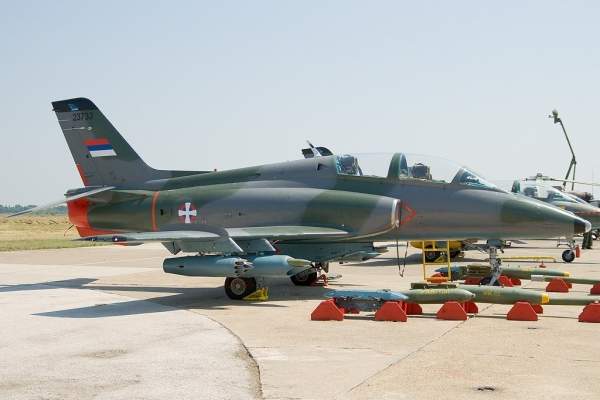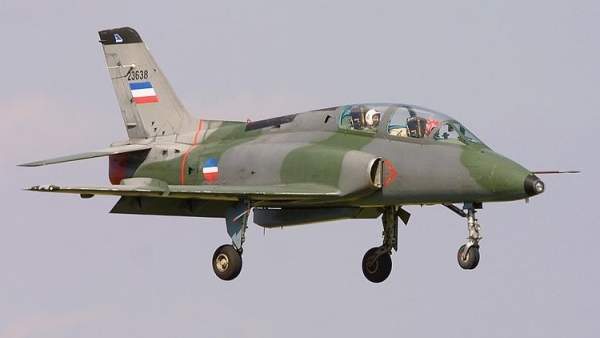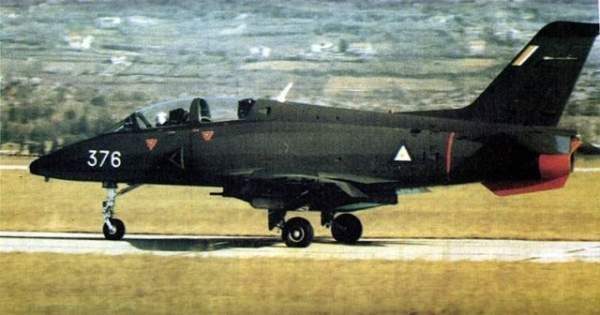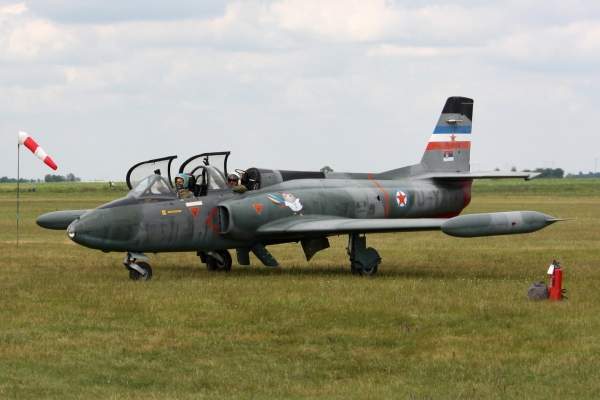The G-4 Super Galeb is a single engined, two-seater modern trainer and ground attack aircraft that was designed and manufactured by the Soko Aircraft Factory of Bosnia. The aircraft was derived from the G-2 Galeb jet trainer. Approximately 91 G-4s have been built since 1983.
The aircraft is 12.25m long and 4.3m high, with a wingspan of 9.88m. It weighs 3,250kg when empty and can carry 1,882kg of fuel.
Variations of the Soko G-4 Super Galeb aircraft
A total of four G-4 variants were produced, namely the G-4S, G-4T, G-4M and G-4MD. The G-4S is an unarmed modern jet trainer with no armaments attached. The G-4T is an advanced version of the G-4S, a target puller aircraft.
The G-4M, an upgraded model of G-4, is fitted with modern avionics suite and armaments. The avionics suite includes a Zrak ENP-MG4 head up display, a gyro platform, multifunctional displays and additional chaff or flare dispensers.
The variant is fitted with a cannon, four BL755 cluster bombs and two air to air missiles.
The G-4MD is an advance version of the G-4M incorporated with liquid crystal display flight screens, head up displays, hands on throttle and stick, distance measuring equipment, global positioning system, mission computers, identification friend or foe, mission records, an instrument landing system, VHF omni-range and navigational communication systems.
Orders and deliveries of the military trainer aircraft
Myanmar procured 12 G-4s in two batches between 1991 and 1992, of which only four are operational currently.
Deliveries to the Serbian Air Force concluded in October 2010. The Serbian Air Force currently operates a fleet of 23 G-4s, of which 15 are being upgraded to G-4MD.
Development of the Bosnian-built ground attack aircraft
The development of the G-4 Super Galeb began in May 1975 with the requirement of the then Yugoslavian Government to replace its obsolete Lockheed T-33 Shooting Star and G-2 Galeb trainer jets with a new aircraft.
A total of six pre-production G-4s were built for what was then Yugoslavia under the designation G-4 PPP by 1978. The maiden flight of the first G-4 prototype took place in July 1978. The second prototype completed its first flight in December 1980.
Production commenced in 1982 and the aircraft entered service with the Yugoslavia Air Force in 1983. The G-4 Super Galeb was showcased at the Paris Air Show held in May 1983.
The Soko facilities were transferred to Serbia in 1992 and the production was ceased in the same year.
Features of the Soko G-4 Super Galeb
The G-4 features a low wing monoplane design with slightly tapered wings. The aircraft is fitted with a short nose cone, rounded fuselage, conventional empennage, semicircular air intakes, vertical tailfins, rudder, ailerons, horizontal stabilisers and fuel tanks at the square tips.
The pressurised cockpit of the G-4 can accommodate two crew members, including a trainee pilot and flight instructor in tandem seat configuration. It is enclosed by a bubble shaped multipiece glass canopy that opens upward.
The cockpit is fitted with two ejection seats with the rear seat slightly elevated to render all round clear visibility. It is also incorporated with a head up display, a multifunctional display, hands on throttle and stick control system and voice over recorder.
Communication equipment installed includes VHF radio, inertial navigation system, a global positioning system and a standby compass.
Armaments and weaponry of the Soko Aircraft Factory-manufactured trainer
The G-4 is armed with a detachable 23mm Gsh-23L two-barrel cannon which can fire munitions at the rate of 200 rounds a minute.
The aircraft has four hardpoints (two inner and two outer wing pylons) and ventrally gun pods. It can carry 2,053kg of disposable stores.
Other armaments attached include AA-8 and AA-11 air-to-air missiles, two AGM-65B Maverick air-to-surface missiles, bombs, cluster bombs, rocket pods, dispenser weapons, large-calibre rockets, drop tanks and electronic counter measure pods.
The G-4 Super Galeb is powered by a single Rolls-Royce Viper 632-46 turbojet engine rated at 17.8kN of thrust. The G-4 is fitted with a tricycle type retractable landing gear comprising two main wheels and a single steerable nose wheel.
The G-4 can climb at the rate of 31m/s. The maximum and cruise speeds of the aircraft are 920km/h and 550km/h respectively. The stall speed is 180km/h.
The maximum range and service ceiling of the aircraft are 1,900km and 12,850m respectively. The combat range is 1,300km.
The Global Military Aircraft Market 2011-2021
This project forms part of our recent analysis and forecasts of the global Military Aircraft market available from our business information platform Strategic Defence Intelligence. For more information click here or contact us: EMEA: +44 20 7936 6783; Americas: +1 415 439 4914; Asia Pacific: +61 2 9947 9709 or via email.








